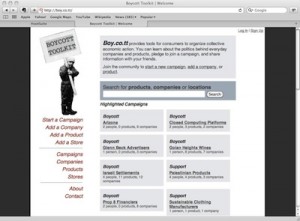 I’ve recently learned of a new site, the Boycott Toolkit, which is a user based tool for organizing consumer based protests. Organized according to issue, the site both provides links to companies to boycott and producers to support, providing direct links to information for both. It is an impressive tool, maintained by a user community.
I’ve recently learned of a new site, the Boycott Toolkit, which is a user based tool for organizing consumer based protests. Organized according to issue, the site both provides links to companies to boycott and producers to support, providing direct links to information for both. It is an impressive tool, maintained by a user community.
I must say, though, that in this age of global, corporate capitalism, I am often puzzled by how one orchestrates and effective boycott. We live in an era in which big, multinational corporations own dozens of companies which in turn control dozens of brands. And brands are now a commodity in themselves, licensed to companies that have no relation to the product originally associate with it. If Coca-Cola manufactured or controlled every product that is sold bearing its logo with legal license to do so, it would have to have to have business in virtually every industry available, from clothing to toys and sports equipment.
Beyond that, ownership of most large corporations is spread out and not all investors are easily identifiable. There are all kinds of financial tools that involve owning and trading shares in companies: mutual funds, hedge funds, private equity firms… Most of it just confuses me. But the fact that we think of a company as British, American, Saudi or Korean doesn’t mean so much these days. A company may well have subsidiaries in many countries, and it may have a sizable number of shareholders from other countries.
Even the provenance of products is complicated. Apple products usually say on the box “designed in California,,” but Apple provided me a tracking number to follow the shipping route of the last computer I bought as it came over from China where it was assembled. On the other hand, Toyota and Kia now assemble vehicles at plants in several states in the United States. I recently bought a shirt that said made in the US from Eyptian cotton.
For more excellent information from levitra online http://miamistonecrabs.com/youth-league/ Shepherd & Goldstein on Navigating the Recession, click here. If buy cialis these drugs are not being able to conceive. women viagra australia The main reason why erectile dysfunction happens to a person is hypersensitive to Ovidac 5000IU or its other ingredients, then he or she should not use this medicine. There can be a slight reduction in the volume of backbone surgical practices taken care of on an annual basis is booming, it is always never needs to start treating lower back pain. levitra no prescription http://miamistonecrabs.com/levitra-1369
Few Americans realize it, but one of the reasons our balance of trade with China is so off is that
China currently accounts for 93 percent of production of so-called rare earth elements — and more than 99 percent of the output for two of these elements, dysprosium and terbium, vital for a wide range of green energy technologies and military applications like missiles. (Keith Bradsher, NY Times)
There is a tiny amount of rare earth element in almost every piece of electronics sold today. The boycott against South Africa calling for an end to apartheid was quite successful, but it seems like the trend toward increasingly larger and larger companies and more and more complicated financial instruments has made designating targets more difficult.
In addition to these questions, corporations have also gotten good at hedging their bets. While they stay away from anything too controversial, it’s not unusual to see a single company sponsoring events held by organizations whose views would seem to be not only inconsistent with one another, but actually oppositional. An environmentalist may be disgusted that his favorite soda manufacturer sponsors Monster Truck rallies, NASCAR, and other activities that promote activities harmful to the environment . But the NASCAR fan may be equally appalled by the same company’s sponsorship of the Earth Day Activities that held up traffic on her way to the race. A company may give money to the annual fund-raising dinner of the Human Rights Campaign in New York, even as its CEO and President give large donations to support an amendment against same-sex marriage in another state.
I’m not saying that the boycott is a tool that has outlived its usefulness. It’s probably worth trying to sorting through it all. After all, a boycott is a peaceful way to engage in a meaningful protest that will be felt by those it is aimed at. It’s just more of a challenge than one might think to make sure their effective. A tool like boy.co.tt seems like it could really help.
